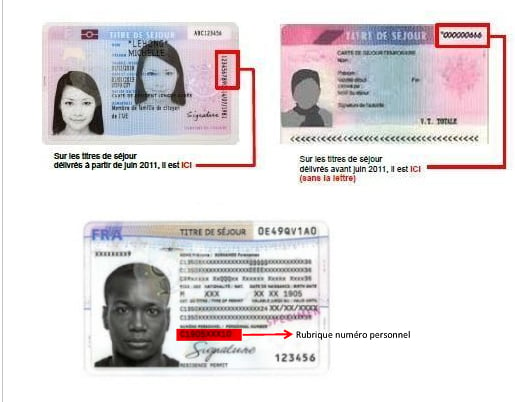If you’re a non-EU citizen and you’re living in France you will almost certainly need to get a carte de séjour residency permit, and keep it up to date to prove your right of residency.
If your card is lost, or you fall victim to pickpockets, you will need to replace it.
Online
For most people, the process of requesting a duplicata or replacement of your carte de séjour is quite simple and can be done online, via this page.
There is, however, a €225 fee, or €75 fee if you are a student or applied for your card as part of a family.
- A self-written document, declaring that you have lost the carte de séjour (you can find an example here – but obviously, remove the letterhead;
- A copy of your original carte de séjour (if you have one – it’s recommended that everyone photograph the front and back of their card when they get it, just in case);
- A copy of your passport (including pages with ID information and and entry stamps);
- A copy of your birth certificate;
- If your right of residency comes through marriage or family, a copy of your partner/family member’s carte de séjour or ID card, as well as your marriage certificate;
- Proof of address;
- Three ID photos;
- Proof of payment of the fee (if you are a victim of domestic violence or human trafficking then the replacement is free)
If you have the necessary documentation, this process should take a matter of weeks.
If you lose your carte de séjour overseas
Things become a little more difficult if you lose your carte de séjour overseas.
You must first declare the loss to local police authorities and then to your closest French embassy or consulate (who will want to see proof that you have declared your loss to the police as well as a déclaration sur l’honneur).
Be sure to have official written evidence of both declarations, signed or stamped by the authorities – you may be asked to provide it as evidence when asking for a replacement.
In order to return to France, you may need to ask for a visa de retour from the embassy or consulate concerned. Before giving you this visa, they will need to verify that you once obtained a carte de séjour from whichever préfecture you applied to. A harrowing advisory is written on service-public.fr: “This investigation can be lengthy.”
Upon your return to France, you must apply for a duplicata via this website.
You will need all the same documents as if you had lost your carte de séjour in France.
Post-Brexit carte de séjour
If you are British and were living in France before December 31st 2021, and therefore got your carte de séjour under the Withdrawal Agreement, there are a couple of things to be aware of.
In order to create the online account necessary to demand a duplicata, you must enter your visa or titre de séjour number (also known as a numéro AGDREF). This is a 13-digit number which on a standard carte de séjour is either along the top or the side, as below.

On the post-Brexit carte de séjour it is listed as the Numéro personnel and is just above the signature on the card.
Under the Withdrawal Agreement, the post-Brexit carte de séjour was free, and it seems that UK nationals who have lost their cards are not being asked to pay a fee for a replacement, although this may vary.
READ ALSO Visas and residency permits: How to move to France (and stay here)
Préfecture appointment
If you’re unable to use the online system you will have to either email, call or show up at the préfecture and explain the situation in as much detail as possible.
Different préfectures have different systems but in Paris, where carte de séjour applications are dealt with by the Préfecture du Police, the online form to send such a mail, can be found here or email [email protected]
Préfectures will then send you either an appointment, or a letter inviting you to visit when convenient. Some have their own list of required documents which can be different to the ones demanded by the online portal, so take careful note of what they are asking you for.
Most préfectures will process your request and then send out the card in the post within four weeks.



 Please whitelist us to continue reading.
Please whitelist us to continue reading.
Incredibly helpful… I just need to change my address on my CdS, but the online website doesn’t recognize my information. Good to know this was a common bug. I’ve been doesn’t going back and forth with the online help contact, and getting nowhere. Unfortunately, my local prefecture (Grenoble) doesn’t have an easy way to make an online appointment for this. And they don’t like you to show up with no appointment.
The online system doesn’t always work. All I could get was an error message.
The helpline was NOT helpful. In the end all they could suggest was visiting the prefecture. I did that only to be lead to a computer to complete the application online.
I gave them a copy of my Gendarmes’ report of the theft, copy of the original document that came with the Carte de Sejour, my passport and photographs. I was then told I would be contacted. That was 25 July and and I have heard nothing.